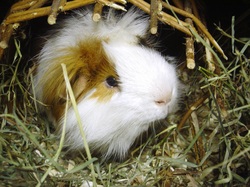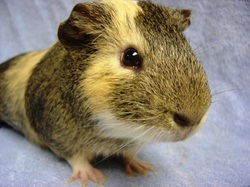| Judge's Park Small Animal Rescue |
|
Judge's Park Guinea Pig Care

Rodney, an Abyssinian guinea pig
Daily feeding:
-Unlimited timothy hay. Alfalfa can be given as treats, but only rarely as it causes health problems (bladder stones, obesity, etc.). Only young guinea pigs (under 6 months) should be allowed access to alfalfa hay).
-1/8 cup of pellets a day, per pig. Adults should have timothy based pellets. For young Guinea pigs (under 4 months), unlimited alfalfa pellets while they are growing.
- Remove uneaten food after 24 hours.
-Recommended brands are Oxbow and Kaytee
-Do not go cheap with pellets; they are very important for nutrition. DO NOT buy pellets with nuts, seeds or fruits in them as they are very bad for guinea pigs.
-Water bottles should be refilled daily
-2-3 servings of vegetables/fruits a day.
-lettuce (pre-washed mixes are good, no iceberg lettuce), spinach (sparingly), dandelion greens, endive, carrots, cucumber, celery, peppers, broccoli, apples, berries (strawberry tops they love), oranges, etc. Vegetables should be fed more than fruits (fruits no more than once or twice a week). They need LOTS of Vitamin C found in lettuces and many other vegetables and fruits!
-No iceberg lettuce, cabbage, pears, beans, onions, garlic or people food
Cages:
-As large as possible plastic bottomed cage, at least 3 square feet per pig
-C and C cages are highly recommended: See here
-Bedding should be aspen or unscented recycled newspaper (carefresh). Cedar and Pine should not be used, oils in them can poison a guinea pig.
-Fleece blankets and cloth puppy pads can also be used in cages and changed twice weekly. Wash with free and clear laundry detergent.
Playtime:
-Always supervise them, especially around other pets and children
-Guinea pigs can get stepped on and dropped very easily, which is usually deadly.
-Always carry guinea pigs while supporting their rear and their front.
-Guinea pigs like to chew, so always provide them with toys
-Example: Wood blocks (untreated and unpainted), cardboard tubes (as long as they can’t get their head stuck), hanging wooden bird toys, etc.
Vererinary Care:
Guinea pigs only require vet visits if something is wrong. Lethargy, nasal discharge, and not eating are bad signs, which require vet care. Find a guinea pig vet before something goes wrong so you have them on hand (See our vets section).
Recommended web sites:
- Guinea Lynx
-Unlimited timothy hay. Alfalfa can be given as treats, but only rarely as it causes health problems (bladder stones, obesity, etc.). Only young guinea pigs (under 6 months) should be allowed access to alfalfa hay).
-1/8 cup of pellets a day, per pig. Adults should have timothy based pellets. For young Guinea pigs (under 4 months), unlimited alfalfa pellets while they are growing.
- Remove uneaten food after 24 hours.
-Recommended brands are Oxbow and Kaytee
-Do not go cheap with pellets; they are very important for nutrition. DO NOT buy pellets with nuts, seeds or fruits in them as they are very bad for guinea pigs.
-Water bottles should be refilled daily
-2-3 servings of vegetables/fruits a day.
-lettuce (pre-washed mixes are good, no iceberg lettuce), spinach (sparingly), dandelion greens, endive, carrots, cucumber, celery, peppers, broccoli, apples, berries (strawberry tops they love), oranges, etc. Vegetables should be fed more than fruits (fruits no more than once or twice a week). They need LOTS of Vitamin C found in lettuces and many other vegetables and fruits!
-No iceberg lettuce, cabbage, pears, beans, onions, garlic or people food
Cages:
-As large as possible plastic bottomed cage, at least 3 square feet per pig
-C and C cages are highly recommended: See here
-Bedding should be aspen or unscented recycled newspaper (carefresh). Cedar and Pine should not be used, oils in them can poison a guinea pig.
-Fleece blankets and cloth puppy pads can also be used in cages and changed twice weekly. Wash with free and clear laundry detergent.
Playtime:
-Always supervise them, especially around other pets and children
-Guinea pigs can get stepped on and dropped very easily, which is usually deadly.
-Always carry guinea pigs while supporting their rear and their front.
-Guinea pigs like to chew, so always provide them with toys
-Example: Wood blocks (untreated and unpainted), cardboard tubes (as long as they can’t get their head stuck), hanging wooden bird toys, etc.
Vererinary Care:
Guinea pigs only require vet visits if something is wrong. Lethargy, nasal discharge, and not eating are bad signs, which require vet care. Find a guinea pig vet before something goes wrong so you have them on hand (See our vets section).
Recommended web sites:
- Guinea Lynx
